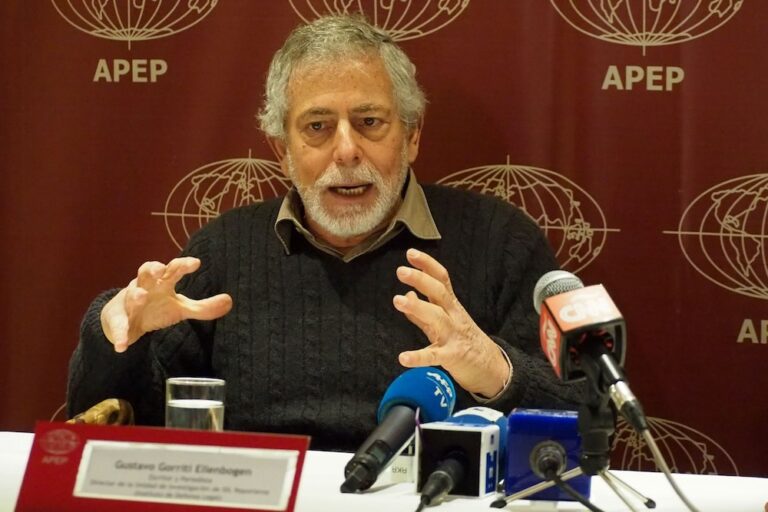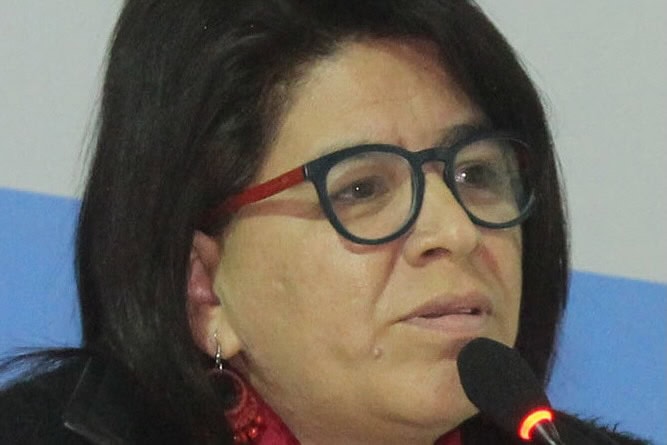(IPYS/IFEX) – On 23 September 1997, having taken the first steps towards the creation of a Peruvian Press Council (Consejo de la Prensa Peruana), the print media who are members of the new organization publicly approved a work plan through which it will seek to support the development of democracy in the country and to […]
(IPYS/IFEX) – On 23 September 1997, having taken the first steps towards the creation of a Peruvian Press Council (Consejo de la Prensa Peruana),
the print media who are members of the new organization publicly approved
a work plan through which it will seek to support the development of
democracy in the country and to monitor the ethical practise of the
profession. At a meeting held at noon in the Cultural Centre of the
University of San Isidro, journalists, members of congress,
intellectuals, and diplomats celebrated the media’s effort at
self-regulation without the intervention of the state, or any other
organization. They said that in this way freedom of information,
expression, opinion and to create new media outlets would be safeguarded
for those who work in the media, and especially for the reading public.
The event was attended by directors and representatives of twelve
national publishers which represent a total of fifteen newspapers and
five magazines. These publishers make up the Peruvian Press Council in
its initial phase. At the meeting, the proposal to gradually incorporate
other publications was formalized.
The president of the board of the Council and sub-director of “El
Comercio”, Alejandro Miro Cisneros, explained that the institution will
funcion both at the professional and legal levels. At the professional
level, it will seek to create an atmosphere of freedom for newspapers,
which is fundamental for their work, by issuing statements and
communiques whenever circumstances require. The second area will be dealt
with through the creation of an Ethics Tribunal and an Executive
Secretary. These bodies will respond to requests from people affected by
publications who are members of the Council and any complaints regarding
alleged ethical transgressions by any print media. The five members and
two substitutes of the Ethics Tribunal will be elected in the next few
weeks by the five board members of the Peruvian Press Council and another
five people recognized for their prestige and honesty.
The Peruvian Press Council has two governing bodies: one professional and
the other legal. The professional body is made up of the general
assembly, comprised of all of the members with the right to vote; and the
Honour Council (Consejo de Honor), currently headed by Alejandro Miro
Quesada Garland. This Council is responsible for accepting new members
and for member suspensions or outgoing members, as well as for approving
the procedures which the Ethics Tribunal and its Executive Secretary
should follow. The Board, headed by Alejandro Miro Quesada Cisneros, is
also part of the professional area. The Board will take positions on
issues related to freedom of the press, will supervise and control
administrative matters, and elect, together with five other external
electors designated by the Honor Coucil, the members of the Ethics
Tribunal. The General Manager of the Council will be responsible for
finances and budgets, and will direct the operations of the organization.
In the legal area, the Ethics Tribunal will issue definitive resolutions
on complaints not resolved in the first instance by its Executive
Secretary. The importance of this Tribunal is that it can issue public
pronouncements on complaints against the media, including those who are
not members of the Peruvian Press Council in cases which involve the
alleged trangression of journalistic ethics. The Executive Secretary of
the Ethics Tribunal investigates the complaints presented by the public
and looks for a resolution with the media concerned. In the next few
weeks, the members of the Board of the Press Council of Peru and the
external electors should be meeting to elect the members of the Ethics
Tribunal. The external electors are: the federal Ombudsman Jorge
Santistevan de Noriega; the president of Confiep, Jorge Picasso; the
president of Indecopi, Beatriz Boza Dibos; the rector of the Catholic
University, Salomon Lerner Febres; and priest Juan Julio Wicht.
IPYS recommends that interested groups or individuals commend the
initiative to form the Peruvian Press Council by sending letters to its
president, Alejandro Miro Quesada Cisneros. (Fax +511 426 0810)


